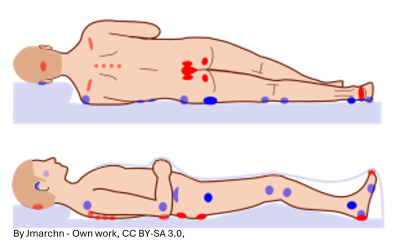Neurodiversity information for parents and young people
About pressure ulcers
A pressure ulcer is an area of skin which has become damaged due to sitting or lying for a long time without moving.
A pressure ulcer can also be caused by a medical device pressing onto your skin (for example a catheter or oxygen mask). The length of time it takes to form a pressure ulcer is different with every patient, but it can be as little as three to four hours.
Who is at risk of developing pressure ulcers
Pressure ulcers can happen at any age but they are more common as you get older.
Any illness that reduces your mobility will increase your risk of developing a pressure ulcer.
People who have the following health problems are at high risk of developing pressure ulcers:
- stroke
- diabetes
- narrowing of the arteries
- conditions which require steroid use
- incontinence
- poor nutrition
- any serious illness
- pain. Patients who experience pain when moving often move less frequently, increasing the risk of pressure ulcers.
Why it is important to stop them from developing
Pressure ulcers can begin as a slight break in your skin. If they are not treated, they can turn into severe wounds that affect your quality of life.
Where they appear on the body
Pressure ulcers which are caused by a medical device can develop anywhere on the body.
Pressure ulcers which are caused by sitting or lying down for long periods of time usually appear over bony areas of the body.

How to avoid them if you are at risk
If you are a hospital inpatient and you have a pressure ulcer, or we think you are at risk of developing one, we will do the following.
- Offer you a special air mattress for your bed and an air cushion for your chair.
- Ask you to move every 2 to 3 hours. If you need help to move, a nurse will help you.
- If you are experiencing pain or pressure from a device, a nurse may reposition the device and add some materials to relieve the pressure. If necessary, they will change the device.
- Encourage you to eat a diet which includes a lot of protein (for example meat, fish and eggs).
- Encourage you to drink plenty of fluids. This helps to reduce the risk of your skin drying out and breaking down.
- We may suggest that you see specialist nurses from the Tissue Viability Team. They can give advice on suitable additional care.
Important
Tell your nurse if you notice any of the following.
- You are developing red areas or sore skin anywhere on your body.
- You are finding it more difficult to move around.
- You are having problems controlling your bowels or passing urine.
- You think you are not eating a well balanced diet.
![]()
Tell your nurse if you do not want us to take preventative measures. For example if you do not wish to use an air mattress or cushion and do not want us to help you change your position regularly.
More information
Contact information
Kingston Hospital Tissue Viability Team, Monday to Wednesday 7.30am to 5.30pm and Thursday to Friday, 7.30am to 4pm